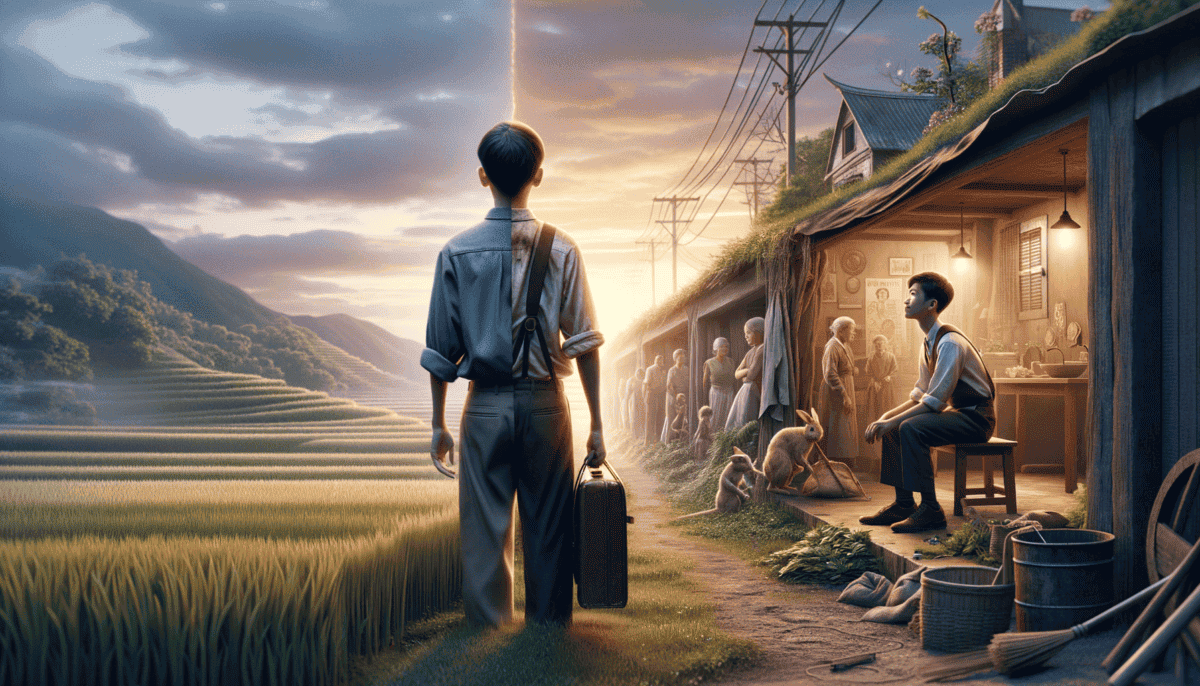A Boy in the Cave Village
Little Xi woke up to the gentle sound of rain patting on the yellow earth above his cave home. The year was 1969, and he was living in Liangjiahe, a tiny village in China's Shaanxi Province.
"Time to get up!" his mother called softly. "The village needs us today."
At just 15 years old, Xi had already learned what it meant to be strong. His home wasn't like other homes – it was a yaodong, a cave carved into the side of a hill. The walls were made of packed earth, and on cold mornings, tiny drops of water would sometimes trickle down them.
The morning light filtered through the cave's entrance, showing the simple furniture inside – wooden stools, a table, and beds made of dried corn stalks. Xi's family hadn't always lived this way. Once, they had lived in Beijing, where his father was an important man in the government.
"Why did we move here, Mother?" Xi asked one morning while helping prepare breakfast.
His mother smiled gently. "Sometimes life takes unexpected turns, my son. But remember – every challenge makes us stronger."
These were difficult times in China. The country was going through something called the Cultural Revolution, when many city people were sent to live and work in the countryside. Xi's family was part of this big change.
Key things young Xi learned in Liangjiahe:
- How to farm the land
- Share with neighbors
- Stay strong when times are hard
- Lead by helping others
- Work hard every day
Life in the cave village wasn't easy. Xi had to carry heavy buckets of water up steep hills. He worked in the fields under the hot sun. Sometimes, his meals were just a few mouthfuls of rice and vegetables. But he never complained.
"Look at how the wheat bends in the wind but doesn't break," his father once told him. "That's how we must be – flexible but unbreakable."
The other villagers began to notice young Xi's hard work. They saw how he would help old Mrs. Zhang carry her heavy baskets, and how he taught younger children to read by firelight after long days of work.
At night, Xi would sit near the cave's entrance, looking at the stars and dreaming big dreams. The same sky that covered his cave home stretched all the way to Beijing and beyond. Maybe someday, he thought, he would do something important to help all the people of China.
Little did young Xi know that his time in the cave village was preparing him for an amazing journey. The lessons he learned about working hard, helping others, and staying strong would shape not just his future, but the future of his entire country.
As the sun set each evening over Liangjiahe, casting long shadows across the yellow earth, Xi would think about all he had learned that day. The cave village was teaching him something very important – that true strength comes not from having an easy life, but from facing challenges with courage and determination.
Learning from the Land
The sun rose over the hills of Shaanxi Province, where young Xi was starting another day of farm work. He was now 16, and the yellow earth had become his teacher.
"Today we learn about wheat planting," said Old Wang, a weathered farmer with kind eyes. "Watch carefully, young Xi."
Xi's hands, once soft from city life, grew tough and strong. He learned to:
- Plant crops in the right season
- Build water channels for farming
- Fix tools with simple materials
- Work together with other villagers
- Lead small farming projects
"Why do you work so hard?" asked Little Ming, a young village boy who often followed Xi around.
"Because," Xi smiled, wiping sweat from his brow, "every grain of wheat we grow helps feed someone's family."
Life wasn't all work. In the evenings, Xi would sit with the villagers, listening to their stories. The old folks talked about their dreams for a better life. Xi listened and learned. He began to understand what regular people needed to be happy.
"Look at how the village works together," his father wrote in a letter. "This is how a country should work too – everyone helping each other."
One day, the village faced a big problem. Their water pump broke down. Without it, the crops would die. Xi stepped forward with an idea.
"If we all work together," he said, "we can dig a new canal from the river."
Many thought it was impossible, but Xi showed them how to organize the work. He dug alongside everyone else, even when his muscles ached. After many days of hard work, water flowed to the fields again.
These years changed Xi deeply. He learned that big changes start with small steps. He saw how working together could solve big problems. Most importantly, he understood that leading means serving others.
At night, in his cave home, Xi would write in his notebook about what he learned. He drew pictures of better farming tools. He made plans for helping the village grow more food. His dreams were getting bigger, but they always started with helping regular people live better lives.
The sent-down youth who arrived in Liangjiahe was becoming a young man with a vision. Every callus on his hands, every problem solved, and every friend made in the village was preparing him for something bigger than he could imagine.
As the wheat swayed in the evening breeze, Xi stood on a hilltop overlooking the village. The same determination that helped him dig canals and plant crops would one day help him plant seeds of change across all of China.
Building Steps to Leadership
The year was 1974, and Xi Jinping stood before the village committee in Liangjiahe. At 21, he was about to take his first big step into politics. ️
“We think you should join the Communist Party,” Old Wang announced with a proud smile. “You’ve shown true care for our village.”
“Thank you for trusting me,” Xi said quietly, remembering all the lessons learned in the yellow earth of Shaanxi.
After joining the Party, Xi moved to new places. Each place was like a new classroom where he learned different things:
• Fujian Province by the sea
• Busy Zhejiang with its factories
• Big city Shanghai with tall buildings
In Fujian, Xi worked hard to help farmers sell their tea and fruit. “Good leaders must understand what people need,” he often said to his team.
“Why do you visit so many farms?” asked a young assistant.
Xi smiled, “Because the best ideas come from listening to regular people.”
In Zhejiang, Xi saw how factories could make things that people all over the world wanted to buy. He helped create new roads and ports so trucks and ships could carry these things everywhere.
“But we must be careful,” he told city leaders. “We need clean air and water too. Growth must be smart growth.”
Each new job taught Xi something important:
- How to help both cities and farms grow
- Ways to keep water and air clean
- How to help people find good jobs
- Making sure everyone has enough food
- Building roads and schools
Xi didn’t just sit in offices. He walked through villages, visited factories, and talked with workers. He remembered his days in Liangjiahe – how important it was to understand real people’s lives.
“Look at how our province is growing!” said a proud factory owner in Zhejiang.
“Yes,” Xi replied, “but are the workers happy? Do their children have good schools?”
These questions showed how Xi was different. He didn’t just want buildings to be tall – he wanted people’s lives to be better.
In Shanghai, China’s biggest city, Xi faced his biggest test yet. The city needed better roads, cleaner air, and more jobs. Xi worked day and night to help solve these problems.
One evening, looking out over Shanghai’s bright lights, Xi thought about his journey. From the cave house in Liangjiahe to the tallest buildings in Shanghai, he had learned that true leadership means helping people live better lives.
Each step up the political ladder made Xi’s responsibility bigger, but his basic idea stayed the same – listen to people, solve real problems, and work hard for a better tomorrow.
The Path to Power
The grand halls of Beijing sparkled with possibility as Xi Jinping prepared for the biggest moment of his life. The year was 2012, and change was coming to China.
Xi nodded, thinking about his journey. Now he would become China’s top leader. But he knew this wasn’t just about him – it was about making life better for over a billion people.
“What will you do first?” asked an old friend from his village days.
“Clean up trouble,” Xi said firmly. “Like when we cleared rocks from the village fields. We must remove things that stop China from growing strong.”
Xi started a big clean-up plan. He called it the “Tiger and Fly Hunt” because it caught both big and small troublemakers:
• Stopped people from taking what wasn’t theirs
• Made rules clearer and fairer
• Helped poor people get better jobs
• Built new roads and trains
• Made China stronger in the world
One morning, Xi visited a small restaurant in Beijing. “Tell me about your life,” he said to the owner.
“It’s hard to run a small business,” the owner shared. “But things are getting better.”
Xi listened carefully. He remembered his mother’s words: “Leaders must have big ears and a small mouth – listen more than you talk.”
He worked to make China stronger in new ways. Scientists got better labs. Students got better schools. Farmers got better tools.
“Why do we need all these changes?” some old leaders asked.
“Because China must grow like a healthy tree,” Xi explained. “Strong roots, strong branches, reaching for the sky.”
Xi remembered his own school days, reading by candlelight in his cave home. Now he wanted every child to have bright lights for studying.
“See how our cities shine!” visitors would say.
“Yes,” Xi would reply, “but we must make sure everyone shares in this bright future.”
As the years passed, Xi worked harder than ever. He visited farms and factories, schools and laboratories. Each place showed him what needed fixing, what needed growing.
“Being a leader is like being a gardener,” Xi told young party members. “You must care for every plant, remove weeds, and plan for all seasons.”
The boy who once lived in a cave now stood in the Great Hall of the People. But he never forgot the lessons from his early days – work hard, care for others, and always think about tomorrow.
Xi’s power grew, but his mission stayed the same: make China stronger and help its people dream bigger dreams.
Building a Global China
The morning sun painted Beijing’s sky in brilliant colors as Xi Jinping stood at his office window. On his desk lay maps showing a bold new plan – the Belt and Road Initiative.
He remembered playing with toy trains as a child. Now he was building real ones – bigger and faster than ever before. These trains would connect cities across Asia and Europe.
“What makes this plan special?” asked a young adviser.
“It’s like making friends at school,” Xi smiled. “When we share and help each other, everyone wins.”
• Build new roads and railways
• Help other countries grow
• Make more Chinese phones and computers
• Share Chinese ideas with the world
• Make new friends everywhere
One day, Xi visited a factory making special phones. The workers showed him how they made things that people all over the world wanted to buy.
“When I was young, we didn’t even have regular telephones,” Xi told them. “Now Chinese phones are in peoples’ hands everywhere!”
He worked to make China a leader in new things like electric cars and space rockets.
“Remember when we could only dream of touching the stars?” he asked at a space center. “Now we’re sending satellites up there!”
Xi traveled to many countries, meeting other leaders and making friends for China. He talked about working together to solve big problems like climate change.
Sometimes other countries didn’t agree with China’s ideas. But Xi stayed calm and patient, just like when he solved problems in his village years ago.
“We must be strong but friendly,” he told his team. “Like bamboo – flexible but unbreakable.”
Xi wanted China to be good at everything – making things, thinking up new ideas, and helping solve world problems.
“When I was a boy,” he shared with students, “China was very poor. Now we can help other countries grow stronger too.”
He pushed for Chinese scientists to invent new things. Soon, China was making its own airplanes, fast trains, and clever robots.
“The future belongs to those who dare to dream,” Xi told young inventors. “Keep thinking big!”
Back in his office, Xi looked at photos of Chinese workers building roads in Africa, teaching computer skills in Southeast Asia, and helping other countries grow food better.
“This is China’s new way,” he said proudly. “We grow stronger by helping others grow stronger too.”
As the sun set over Beijing, Xi thought about how far China had come. From a poor country to one that could help others. From borrowing ideas to creating new ones. From following others to helping lead the way.
Shaping Tomorrow’s China
The Great Hall of the People buzzed with excitement. Xi Jinping walked onto the stage, his face bright with pride. Today, he would share his big dreams for China’s future.
He pulled out an old photograph from his pocket. It showed his younger self, smiling with villagers in Liangjiahe.
“Look how far we’ve come,” he said softly. “But our journey isn’t over.”
• Happy homes for everyone
• Clean air and water
• New jobs in science and technology
• Strong friendships with other countries
• A peaceful, beautiful world
In his office, Xi kept a special calendar. He marked important days when China would reach new goals.
“We must think ahead,” he told his helpers. “Like planting a tree – we work today for tomorrow’s shade.”
He visited a school where children were learning about robots and computers. Their eyes sparkled with curiosity.
“When I was your age, I read books by candlelight,” Xi shared. “Now you can learn from teachers all over the world through computers!”
Xi worked to make sure old Chinese wisdom stayed important while China grew modern and new.
Sometimes, people asked Xi why he worked so hard. He would smile and remember his days in the village.
“Every step forward matters,” he’d say. “Just like how I learned to farm, one day at a time.”
Xi wanted China to help solve big world problems. He talked about saving nature and making clean energy.
“The Earth is like our garden,” he explained. “We must take good care of it.”
He thought about the cave where he once lived, and now he helped guide a great nation. The little boy who read books by candlelight now helped write China’s future.
“Remember,” Xi often said, “dreams become real when we work hard together.”
As evening fell over Beijing, Xi looked out at the city lights. They reminded him of stars – bright points of hope in the darkness.
“China’s story is like a great river,” he thought. “It keeps flowing, growing stronger, carrying hope for tomorrow.”
The cave dweller had become a leader, but his heart stayed true to the lessons he learned long ago – work hard, care for others, and never stop dreaming big. China’s journey, like Xi’s own path, showed that amazing things could happen when you believe in better tomorrows. ⭐






